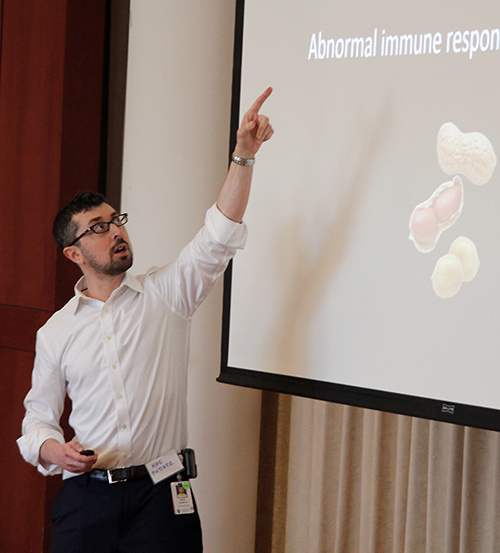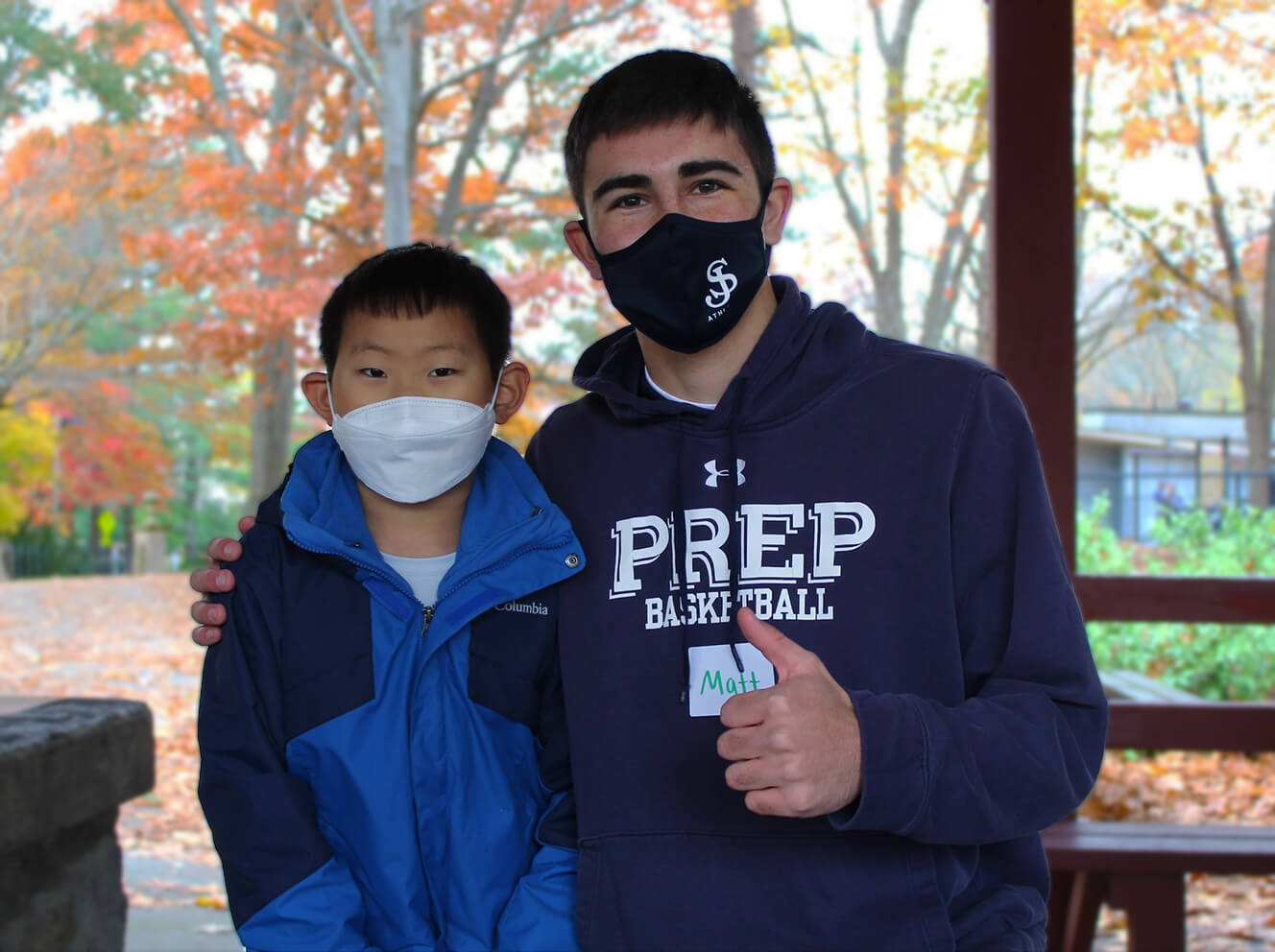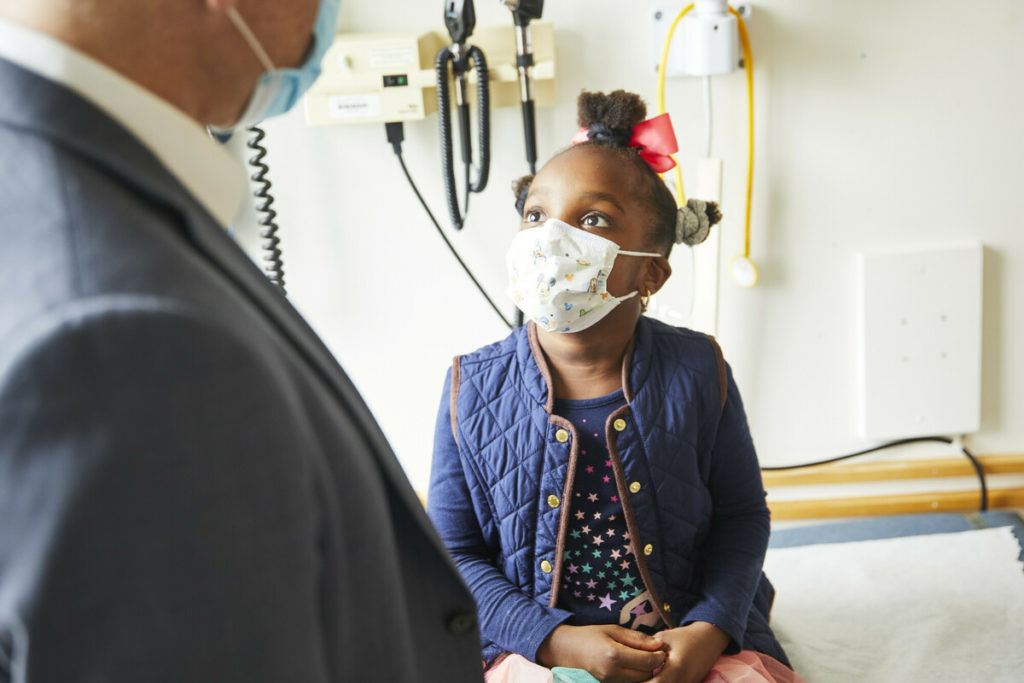Simon Lee, 9, realized something when he began attending the Food Allergy Buddies Program, a mentorship program created by MassGeneral Hospital for Children (MGHfC).
“I was surprised,” says the third grader from Needham, Mass. “I was like, ‘Wow, so many people have food allergies!”
Simon has been allergic to peanuts and tree nuts for as long as he can remember. At 15 months old, after eating his first and only peanut butter and jelly sandwich, he broke out in hives that covered his entire body. A more recent reaction required treatment with an epinephrine auto-injector, a medication used to treat an allergic emergency.
All in all, Simon experienced several severe reactions after his diagnosis. They were scary experiences for a young child, says his mother, KumRae Lee, and, like some children with food allergies, Simon developed anxiety about his allergy and about eating away from home. Simon also told his mother that he worries about growing up and being responsible for reading food labels and staying safe.
“Even though he’s little, he still thinks about how I am not always going to be there to help him,” KumRae says.
Parents of children with food allergies may also experience anxiety related to the diagnosis. To avoid accidental exposures to foods, some parents may limit activities like play dates, sleepovers and travel, says Mike Pistiner, MD, MMSc, director of Mass General’s Food Allergy Advocacy, Education and Prevention at the Food Allergy Center and of the Food Allergy Buddies Program. An MGHfC Facebook survey of 100 families found that 60% of parents of kids with food allergies limited their child’s participation in school-based events and 77% placed limits on their family’s dining out. That same survey found 88% of parents indicated social isolation as a major issue and identified a need for social events for kids with food allergies.
Buddying Up to Alleviate Anxiety
Simon’s medical team at MGHfC includes a gastroenterologist, allergist and a food allergy psychologist through the Food Allergy Center. Throughout 2021, Simon met with a food allergy psychologist who suggested the Food Allergy Buddies program offered by the Food Allergy Center at MGHfC might be a good fit for Simon. The Buddies program groups high school-aged mentors (called Bigs) with elementary school-aged kids (called Littles) as well as middle school-aged kids (called Middles) who have all been diagnosed with food allergies.

“There are established mentorship programs for other chronic medical issues like diabetes,” says Dr. Pistiner. “We wanted to build a community where children with food allergies have the opportunity to get to know, have fun with and learn from other kids who also have food allergies.”
On September 19, 2021, when Simon arrived at a Food Allergy Buddies outdoor meeting at Auburndale Park in Newton, Mass., he was excited to spend the afternoon with the other program participants, which included a total of about 60 Littles and 30 Bigs. Simon connected with one of his “Bigs,” 17-year-old-Matt Ciampa of Lynnfield, Mass.
Along with their Bigs, the Littles learned about safe food choices and how to advocate for themselves. The Bigs gave the Littles situations to talk through, like what to say if your friend’s mother offers you pizza and you’re allergic to cheese, or what to do at school if you feel your throat tightening and think you are having an allergic reaction. Meeting attendees also decorated a T-shirt with the Food Allergy Buddies logo and ran around outdoors in relay race games. The parents of the younger children met as a group to learn more about food allergy management. KumRae says it was good for Simon to learn how other families also take precautions with food.
“This program is a great way for him to see teenagers who are successfully doing activities with friends, making good choices and feeling empowered,” says KumRae.
“A lot of the way we socialize involves food. If a child has a food allergy, this can sometimes take some of the fun and positive experience out of going to a party or an event,” says Dr. Pistiner. “With the Buddies program, we want to de-emphasize food, and instead emphasize activities, interests and community.”
Passing on Experience
“It has been so rewarding to see the Bigs embrace their roles as mentors in the program,” says Maria Theodorakakis, PhD, pediatric psychologist at MGHfC and co-director of the Food Allergy Buddies program. “They are interacting with their Littles in a deep, caring manner and forming connections that extend far beyond their shared experience of managing food allergies.”
Simon’s Big Buddy Matt is allergic to peanuts and also receives care at MGHfC. For Matt, checking a label for peanuts is second nature. He’s been taking good care of himself since he was young, and now, as a junior at St. John’s Preparatory School in Danvers, Mass, he hopes to share that experience and the confidence to advocate for yourself with his “Littles,” including Simon. Matt says he wants Simon and other kids with food allergies to know it is OK to speak up, even if it feels awkward to inquire what ingredients are in food other people offer them.
“I would have liked to have had this program when I was younger,” Matt says.
- To make a gift or learn more about supporting the Food Allergy Buddies program, please contact us.
- To contact the Food Allergy Center directly, please call 617.643.6834.


